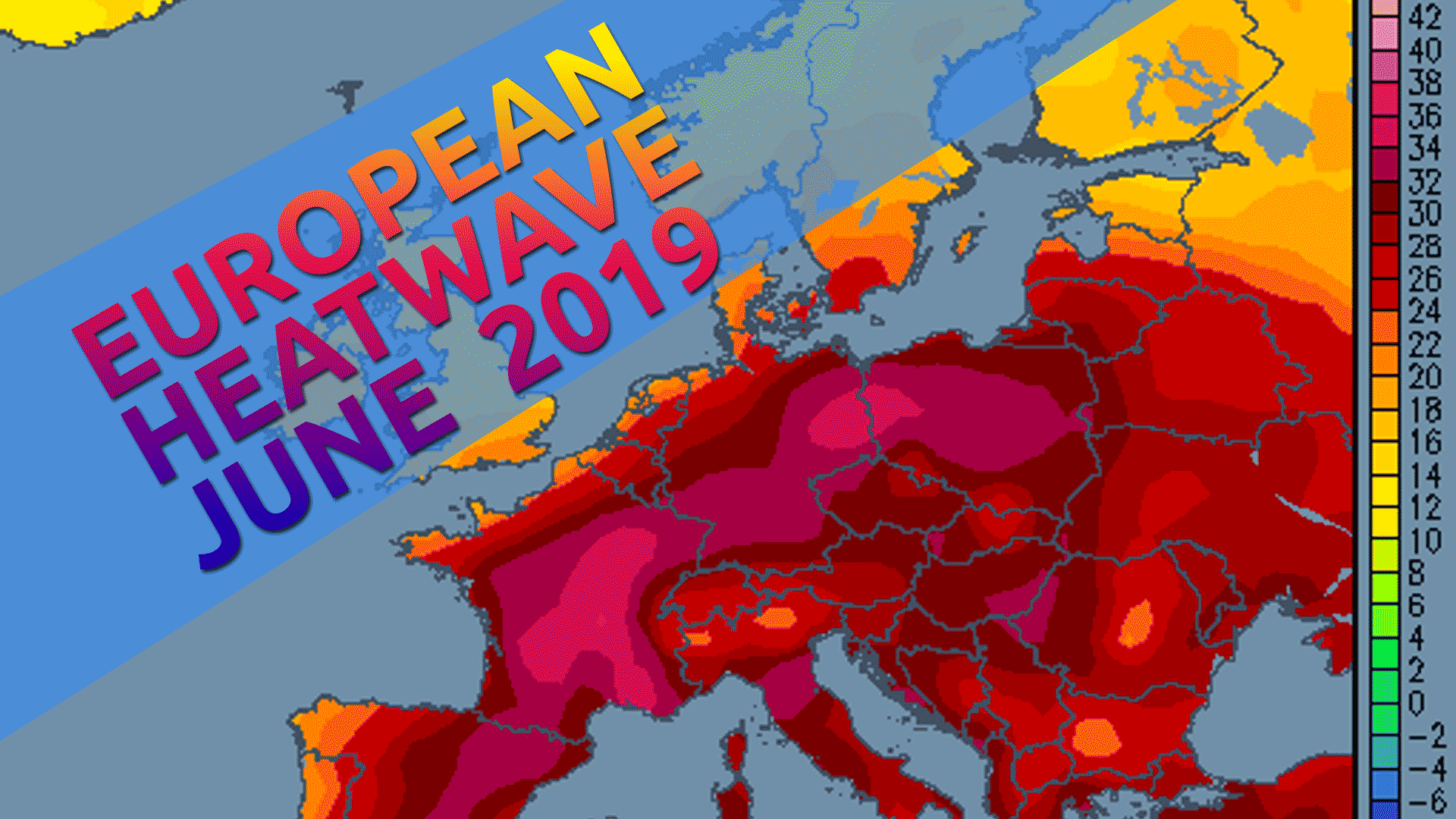Extreme European Heatwave June 2019
A vicious heat wave next week could produce all-time highs at multiple European cities. This heat wave—which will be unusually strong for so early in the summer—will gin up some of the hottest June temperatures ever recorded in western and northern Europe.
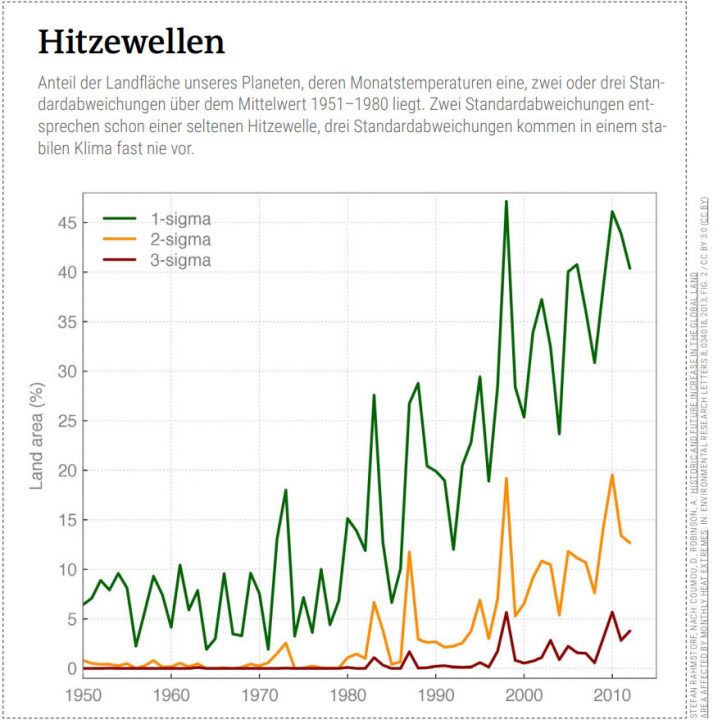
On June 20, 2019 meteorologist Bob Henson from Wunderground wrote, “A vicious heat wave next week could produce all-time highs at multiple European cities. This heat wave—which will be unusually strong for so early in the summer—will gin up some of the hottest June temperatures ever recorded in western and northern Europe.”
Climate experts pointed out (German link) the connection of heatwaves and our changing climate system. Early attribution studies on this event and others show heatwave’s ramping up, become stronger. Heat wave was several degrees Celsius hotter than an equivalent event in 1900.
The current early in Summer heatwave in comes in light of Europe has had five 500-year summers in the past 15 years.[2]
Climate scientist Mark Maslin noted that the heatwave was caused by a jet stream configuration marked by extreme Rossby waves, making way for tropic air into the far north, a similar scenario for what happened during the summer’s in 2003, 2006, 2015, and in 2018. Further reading: The weakening summer circulation in the Northern Hemisphere mid-latitudes
The August 2003 heatwave is often cited for it’s high mortality figures, which have been in part due to high levels of ozone, however, currently at least in Germany ozone levels are not a concern. Ozone levels are currently mostly moderate in the affected regions. High ozone concentrations are an important co-exposure during heat waves. Air pollution index bulletins for France.
EuroNews: Europe is being swept by strong, hot winds from Africa which are also bringing a high concentration of small particles PM2.5 which stay in the air for a long time as they are so light.
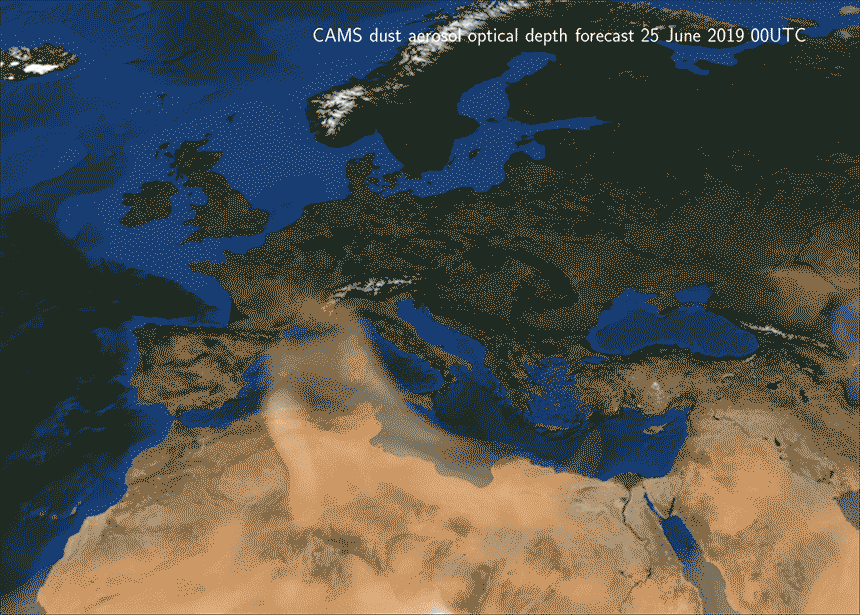
According to a study by the American Heart Association, “exposure to PM(2.5) over a few hours to weeks can trigger cardiovascular disease-related mortality and nonfatal events; longer-term exposure (eg, a few years) increases the risk for cardiovascular mortality to an even greater extent than exposures over a few days and reduces life expectancy within more highly exposed segments of the population by several months to a few year.”
The unusual intense European June heatwave of 2019, is likely to break many temperature records for this month of the year. Record temperatures in affected countries are usually below 39C.
Data show that the normally eastward atmospheric summer circulation of the NH mid-latitudes has slowed down, including the jet stream. This favors more hot-and-dry conditions over the continent and is likely linked to Arctic warming. Coumou et al. 2015: https://t.co/wsQbn8l5VP pic.twitter.com/VqaIp3rNVS
— Stefan Rahmstorf (@rahmstorf) June 24, 2019
Austria
In Austria 26 stations recorded all time high temperature records.
Belgium
An important highway (E411) connecting Belgium with Luxembourg had to be closed due to road damages.
Czech Republic
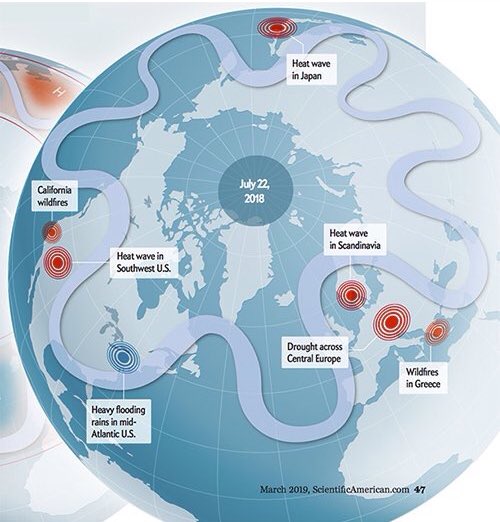
The Czech Hydro-Meteorological Institute said on June 26th, the temperature reached 38.5 Celsius (101.3 F) in Doksany — a Czech Republic high for the month, and later that day reached 38.9C. New daily records were set at some 80% of local measuring stations.
France
Paris closes schools, in anticipation of temperatures above 40C. Additional, in Paris, Lyon, Marseille and Strasbourg [1], only the least polluting vehicles are allowed on the roads. Targeting vehicles including gasoline cars from 2005 or older and diesel cars from 2010 or older, affects nearly 60% of vehicles circulating in the Paris region. Violators face fines. The level of regions on alert was never higher than during the current heatwave, with 78 France departments on orange alert. On June 27th, French Health Minister Agnes Buzyn said four administrative regions in the south had been placed on red alert, the highest crisis level, with 76 others on orange alert.[1]
France’s Nevers set a new record high with 37.7°C, the record was also broken at Charolles this Wednesday: 38.5°C. At Clermont-Ferrand a new record of 40.9°C was achieved, and 41,1°C in Montclus.
On Friday the 28th 2019, France has recorded its all-time hottest temperature, 45.9C (114.6F). On Sunday the 30th, Strasbourg (Entzheim) set a new record with 38.8°C.
Germany
In the state of Sachsen-Anhalt officials declared special speed limits, due to the dangers of buckling roads from heat exposure. High temperatures bend railroads tracks of a small steam powered train near Rostock, as well as more regular train tracks in Kaiserslautern.
Due to continued drought and heat conditions in the town of Bad Oeynhausen the major asked the public to avoid using drinking water for irrigation and recreational activities. About 120,000 people are affected by running out of water. Near Germany’s capital Berlin several wildfire threats were reported.
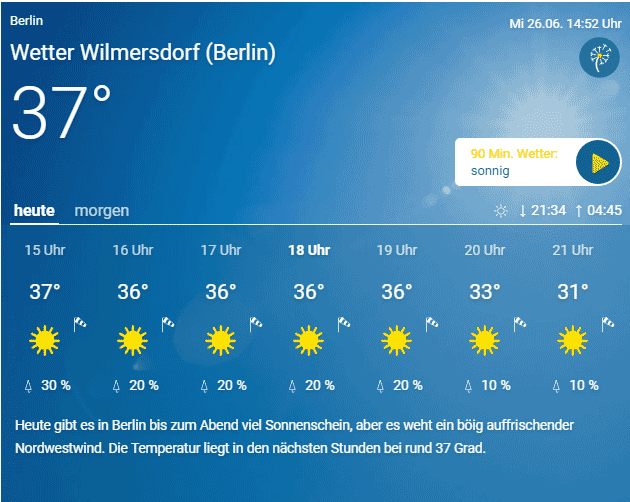
Berlin breaks all time high temperature record with 37C (yet to be confirmed), the highest temperature ever recorded for the month of June. Fun fact, the new high was recorded at my location. According to the German weather service, on June 26th 2019 new temperature records for the month was reached in the state of Brandenburg, town of Coschen, with 38,6C, and Bad Muskau. See the list of the hottest places in Germany on 26th 2019.
However, on June 30th 2019, the record was again broken, with 39,6C.
Italy
In Milan high electricity demand caused sporadic power blackouts.[3]
Netherlands
The night to the 25th 2019, made it the warmest night temperature ever recorded in the Netherlands, in Eidhoven the temperature remained at 22.9C, other towns also set new high minimum records.
Poland
A new June temperature record was also set in Poland, where meteorologists measured 38.2 Celsius.
Russia
5-10°C warmer than normal over the East Siberian Arctic Shelf where the sea ice is breaking up.
— Kevin Pluck ?? (@kevpluck) June 25, 2019
The East Siberian Arctic Shelf has submerged permafrost containing trillions of tonnes of carbon. pic.twitter.com/ALnVkDxNim
Spain
Huge forest fires in Spain not seen for decades, were fueled by the heat and strong winds, with temperatures expected to rise above 43C (109F). New temperature records were set in Spain with the highest being 43.9°C recorded in Girona.
Switzerland
In Switzerland, 27 locations recorded new record high temperatures, above 35C. On June 27th, swiss officials asked drivers to stay out of cars as ozone pollution climbs. Further reading: An adaptability limit to climate change due to heat stress
Days above 100F/37.7C by 2100 (similar situation likely for Europe. #heatwave #hitze #hitzewelle #EuropeanHeatwave Image via @ClimateCentral https://t.co/IAIL8Swqkk pic.twitter.com/STwNVPfqJo
— Climate State (@climatestate) June 26, 2019
Extreme Temperature Diary-June 30, 2019
Elsewhere
- Another heatwave to hit Saudi Arabia, temperatures might surpass record highs in some parts of the country. http://saudigazette.com.sa/article/570023
- Temperature records are melting away in Miami https://www.washingtonpost.com/weather/2019/06/26/temperature-records-are-melting-away-miami
- Heat pushes Kuwait electricity consumption to a ‘new record’ https://menafn.com/1098636882/Heat-pushes-Kuwait-electricity-consumption-to-a-new-record
- Heatwave cooks mussels in their shells on California shore https://www.theguardian.com/environment/2019/jun/28/california-mussels-cooked-heat
References
- ABCNews Europe heatwave sees temperatures soar and wildfires take hold in Spain https://www.abc.net.au/news/2019-06-28/europe-heatwave-soaring-temperatures-causes-wildfire/11259582
- Europe has had five 500-year summers in 15 years. https://www.nationalgeographic.com/environment/2019/06/europe-has-had-five-500-year-summers-in-15-years
- Wildfires and power cuts plague Europeans as heatwave breaks records https://www.reuters.com/article/us-europe-weather/wildfires-and-power-cuts-plague-europeans-as-heatwave-breaks-records-idUSKCN1TU0H0
Teaser image based on MeteoCentrale weather map.
